Cross Cultural Management: National Culture and MNC Strategy Review
VerifiedAdded on 2022/08/26
|10
|2911
|23
Literature Review
AI Summary
This literature review examines the influence of national culture on the strategies of multinational corporations (MNCs). It begins by defining culture and differentiating between national and organizational cultures. The review explores Hofstede's cultural dimensions and their impact on management practices, using American and Mexican cultures as examples. It discusses how cultural differences affect management decisions, leadership styles, and human resource management. The review also highlights the importance of cultural awareness for managers in international settings and emphasizes that successful MNCs adapt their management approaches to align with local customs and values. The paper concludes by stating the need for businesses to adapt to different cultural settings and that an organization's culture is determined by the combination of environment, type of organization, the characteristics of the organizational structure, and those characteristics.
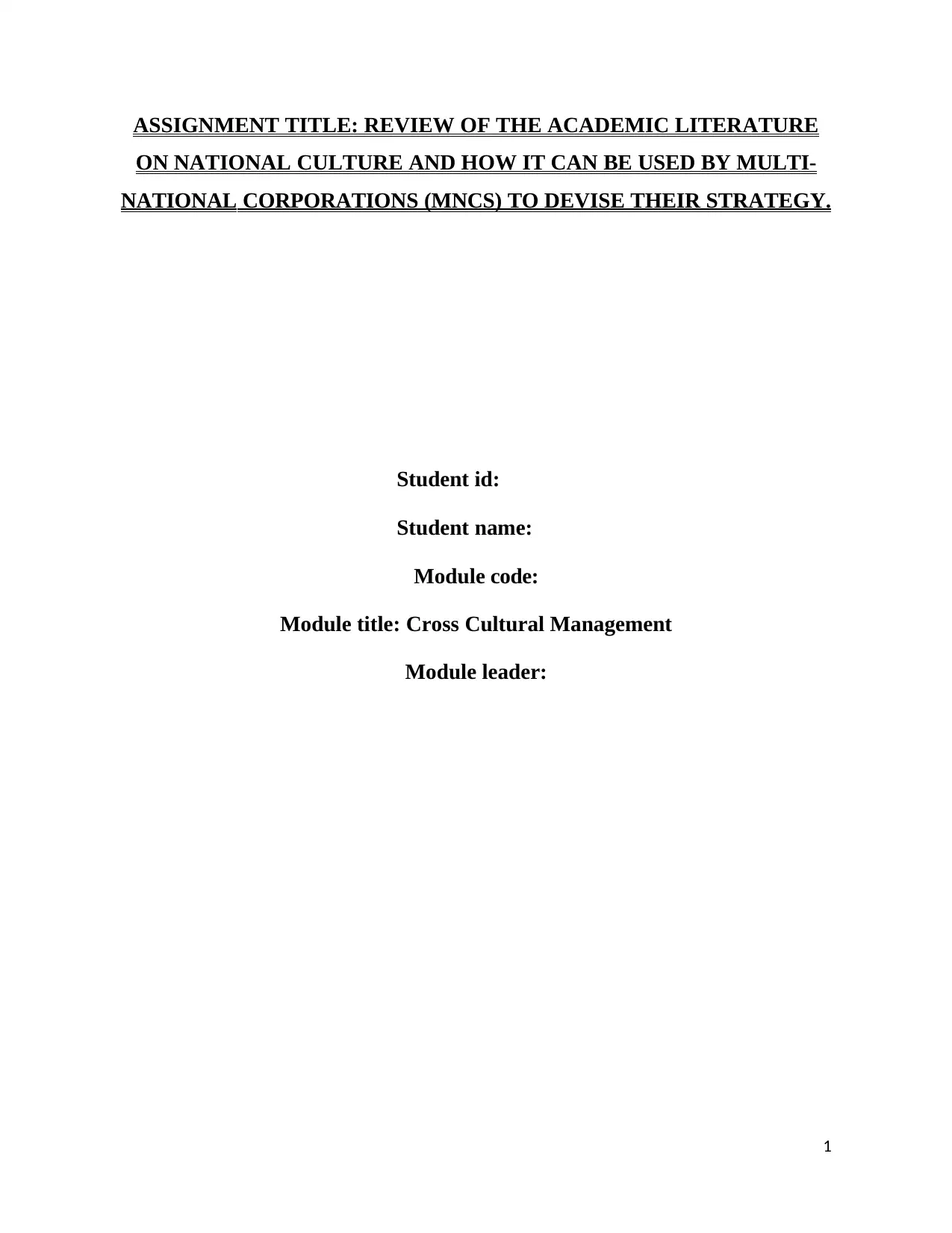
1
ASSIGNMENT TITLE: REVIEW OF THE ACADEMIC LITERATURE
ON NATIONAL CULTURE AND HOW IT CAN BE USED BY MULTI-
NATIONAL CORPORATIONS (MNCS) TO DEVISE THEIR STRATEGY.
Student id:
Student name:
Module code:
Module title: Cross Cultural Management
Module leader:
ASSIGNMENT TITLE: REVIEW OF THE ACADEMIC LITERATURE
ON NATIONAL CULTURE AND HOW IT CAN BE USED BY MULTI-
NATIONAL CORPORATIONS (MNCS) TO DEVISE THEIR STRATEGY.
Student id:
Student name:
Module code:
Module title: Cross Cultural Management
Module leader:
Paraphrase This Document
Need a fresh take? Get an instant paraphrase of this document with our AI Paraphraser
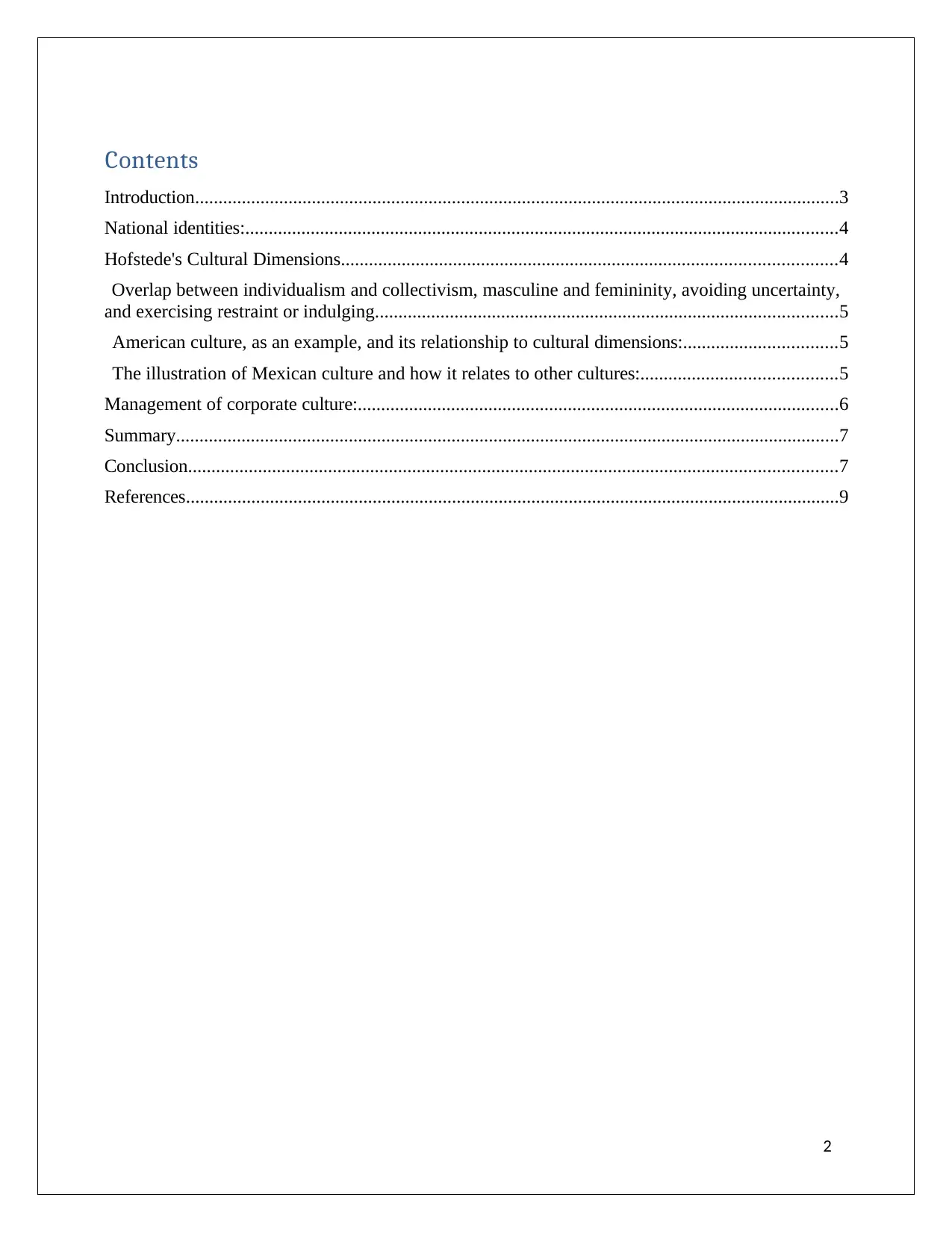
2
Contents
Introduction..........................................................................................................................................3
National identities:...............................................................................................................................4
Hofstede's Cultural Dimensions..........................................................................................................4
Overlap between individualism and collectivism, masculine and femininity, avoiding uncertainty,
and exercising restraint or indulging...................................................................................................5
American culture, as an example, and its relationship to cultural dimensions:.................................5
The illustration of Mexican culture and how it relates to other cultures:..........................................5
Management of corporate culture:.......................................................................................................6
Summary..............................................................................................................................................7
Conclusion...........................................................................................................................................7
References............................................................................................................................................9
Contents
Introduction..........................................................................................................................................3
National identities:...............................................................................................................................4
Hofstede's Cultural Dimensions..........................................................................................................4
Overlap between individualism and collectivism, masculine and femininity, avoiding uncertainty,
and exercising restraint or indulging...................................................................................................5
American culture, as an example, and its relationship to cultural dimensions:.................................5
The illustration of Mexican culture and how it relates to other cultures:..........................................5
Management of corporate culture:.......................................................................................................6
Summary..............................................................................................................................................7
Conclusion...........................................................................................................................................7
References............................................................................................................................................9
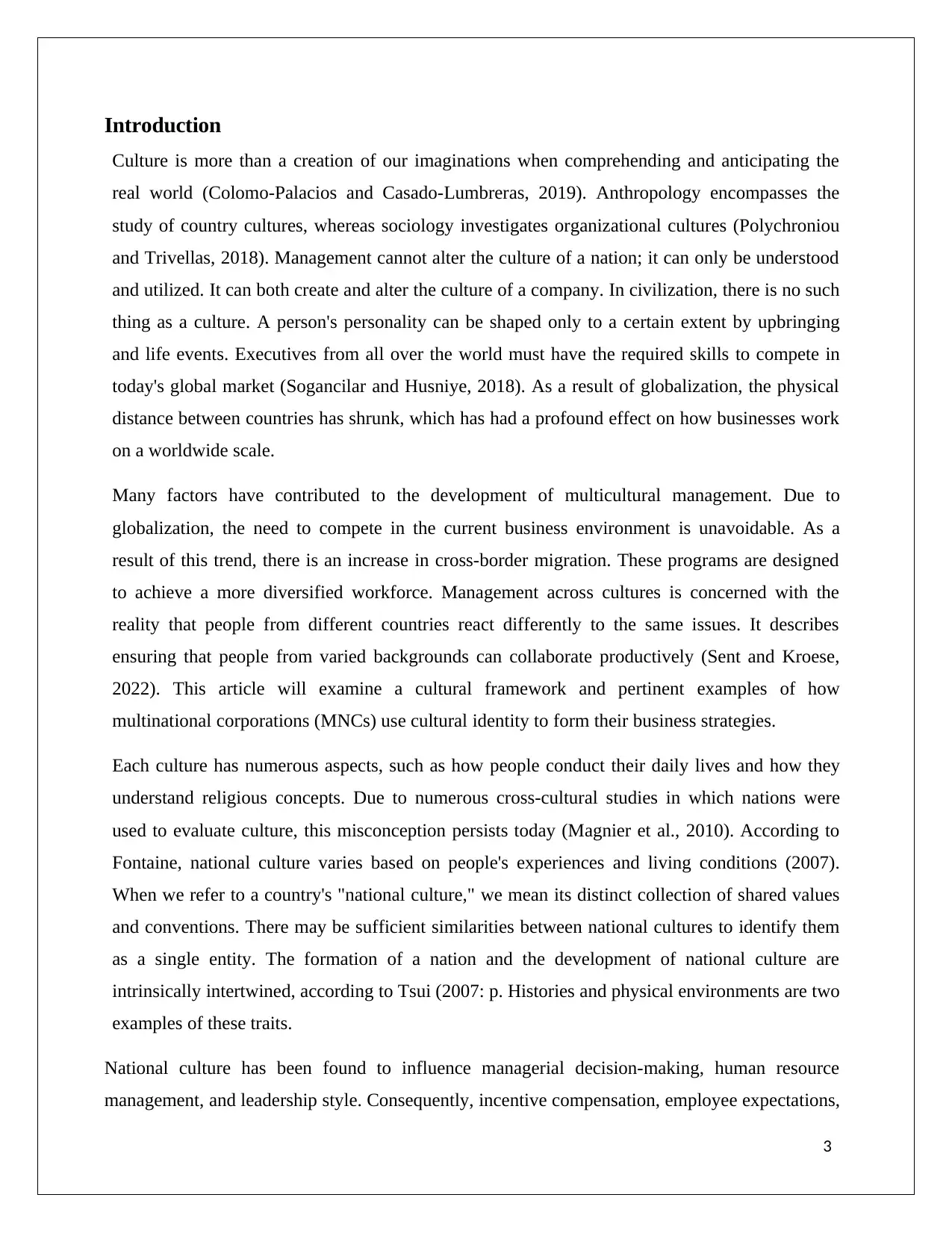
3
Introduction
Culture is more than a creation of our imaginations when comprehending and anticipating the
real world (Colomo-Palacios and Casado-Lumbreras, 2019). Anthropology encompasses the
study of country cultures, whereas sociology investigates organizational cultures (Polychroniou
and Trivellas, 2018). Management cannot alter the culture of a nation; it can only be understood
and utilized. It can both create and alter the culture of a company. In civilization, there is no such
thing as a culture. A person's personality can be shaped only to a certain extent by upbringing
and life events. Executives from all over the world must have the required skills to compete in
today's global market (Sogancilar and Husniye, 2018). As a result of globalization, the physical
distance between countries has shrunk, which has had a profound effect on how businesses work
on a worldwide scale.
Many factors have contributed to the development of multicultural management. Due to
globalization, the need to compete in the current business environment is unavoidable. As a
result of this trend, there is an increase in cross-border migration. These programs are designed
to achieve a more diversified workforce. Management across cultures is concerned with the
reality that people from different countries react differently to the same issues. It describes
ensuring that people from varied backgrounds can collaborate productively (Sent and Kroese,
2022). This article will examine a cultural framework and pertinent examples of how
multinational corporations (MNCs) use cultural identity to form their business strategies.
Each culture has numerous aspects, such as how people conduct their daily lives and how they
understand religious concepts. Due to numerous cross-cultural studies in which nations were
used to evaluate culture, this misconception persists today (Magnier et al., 2010). According to
Fontaine, national culture varies based on people's experiences and living conditions (2007).
When we refer to a country's "national culture," we mean its distinct collection of shared values
and conventions. There may be sufficient similarities between national cultures to identify them
as a single entity. The formation of a nation and the development of national culture are
intrinsically intertwined, according to Tsui (2007: p. Histories and physical environments are two
examples of these traits.
National culture has been found to influence managerial decision-making, human resource
management, and leadership style. Consequently, incentive compensation, employee expectations,
Introduction
Culture is more than a creation of our imaginations when comprehending and anticipating the
real world (Colomo-Palacios and Casado-Lumbreras, 2019). Anthropology encompasses the
study of country cultures, whereas sociology investigates organizational cultures (Polychroniou
and Trivellas, 2018). Management cannot alter the culture of a nation; it can only be understood
and utilized. It can both create and alter the culture of a company. In civilization, there is no such
thing as a culture. A person's personality can be shaped only to a certain extent by upbringing
and life events. Executives from all over the world must have the required skills to compete in
today's global market (Sogancilar and Husniye, 2018). As a result of globalization, the physical
distance between countries has shrunk, which has had a profound effect on how businesses work
on a worldwide scale.
Many factors have contributed to the development of multicultural management. Due to
globalization, the need to compete in the current business environment is unavoidable. As a
result of this trend, there is an increase in cross-border migration. These programs are designed
to achieve a more diversified workforce. Management across cultures is concerned with the
reality that people from different countries react differently to the same issues. It describes
ensuring that people from varied backgrounds can collaborate productively (Sent and Kroese,
2022). This article will examine a cultural framework and pertinent examples of how
multinational corporations (MNCs) use cultural identity to form their business strategies.
Each culture has numerous aspects, such as how people conduct their daily lives and how they
understand religious concepts. Due to numerous cross-cultural studies in which nations were
used to evaluate culture, this misconception persists today (Magnier et al., 2010). According to
Fontaine, national culture varies based on people's experiences and living conditions (2007).
When we refer to a country's "national culture," we mean its distinct collection of shared values
and conventions. There may be sufficient similarities between national cultures to identify them
as a single entity. The formation of a nation and the development of national culture are
intrinsically intertwined, according to Tsui (2007: p. Histories and physical environments are two
examples of these traits.
National culture has been found to influence managerial decision-making, human resource
management, and leadership style. Consequently, incentive compensation, employee expectations,
⊘ This is a preview!⊘
Do you want full access?
Subscribe today to unlock all pages.

Trusted by 1+ million students worldwide
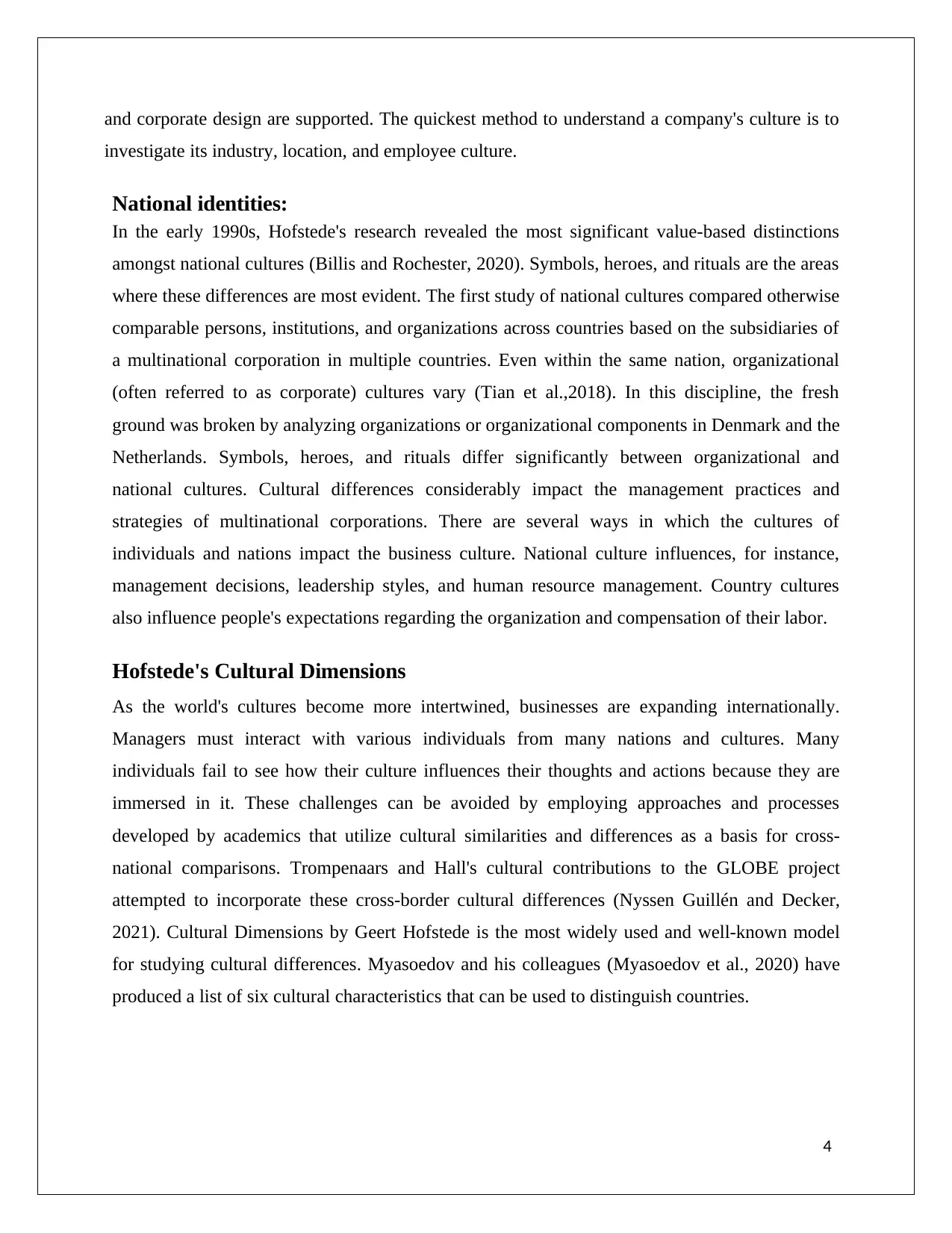
4
and corporate design are supported. The quickest method to understand a company's culture is to
investigate its industry, location, and employee culture.
National identities:
In the early 1990s, Hofstede's research revealed the most significant value-based distinctions
amongst national cultures (Billis and Rochester, 2020). Symbols, heroes, and rituals are the areas
where these differences are most evident. The first study of national cultures compared otherwise
comparable persons, institutions, and organizations across countries based on the subsidiaries of
a multinational corporation in multiple countries. Even within the same nation, organizational
(often referred to as corporate) cultures vary (Tian et al.,2018). In this discipline, the fresh
ground was broken by analyzing organizations or organizational components in Denmark and the
Netherlands. Symbols, heroes, and rituals differ significantly between organizational and
national cultures. Cultural differences considerably impact the management practices and
strategies of multinational corporations. There are several ways in which the cultures of
individuals and nations impact the business culture. National culture influences, for instance,
management decisions, leadership styles, and human resource management. Country cultures
also influence people's expectations regarding the organization and compensation of their labor.
Hofstede's Cultural Dimensions
As the world's cultures become more intertwined, businesses are expanding internationally.
Managers must interact with various individuals from many nations and cultures. Many
individuals fail to see how their culture influences their thoughts and actions because they are
immersed in it. These challenges can be avoided by employing approaches and processes
developed by academics that utilize cultural similarities and differences as a basis for cross-
national comparisons. Trompenaars and Hall's cultural contributions to the GLOBE project
attempted to incorporate these cross-border cultural differences (Nyssen Guillén and Decker,
2021). Cultural Dimensions by Geert Hofstede is the most widely used and well-known model
for studying cultural differences. Myasoedov and his colleagues (Myasoedov et al., 2020) have
produced a list of six cultural characteristics that can be used to distinguish countries.
and corporate design are supported. The quickest method to understand a company's culture is to
investigate its industry, location, and employee culture.
National identities:
In the early 1990s, Hofstede's research revealed the most significant value-based distinctions
amongst national cultures (Billis and Rochester, 2020). Symbols, heroes, and rituals are the areas
where these differences are most evident. The first study of national cultures compared otherwise
comparable persons, institutions, and organizations across countries based on the subsidiaries of
a multinational corporation in multiple countries. Even within the same nation, organizational
(often referred to as corporate) cultures vary (Tian et al.,2018). In this discipline, the fresh
ground was broken by analyzing organizations or organizational components in Denmark and the
Netherlands. Symbols, heroes, and rituals differ significantly between organizational and
national cultures. Cultural differences considerably impact the management practices and
strategies of multinational corporations. There are several ways in which the cultures of
individuals and nations impact the business culture. National culture influences, for instance,
management decisions, leadership styles, and human resource management. Country cultures
also influence people's expectations regarding the organization and compensation of their labor.
Hofstede's Cultural Dimensions
As the world's cultures become more intertwined, businesses are expanding internationally.
Managers must interact with various individuals from many nations and cultures. Many
individuals fail to see how their culture influences their thoughts and actions because they are
immersed in it. These challenges can be avoided by employing approaches and processes
developed by academics that utilize cultural similarities and differences as a basis for cross-
national comparisons. Trompenaars and Hall's cultural contributions to the GLOBE project
attempted to incorporate these cross-border cultural differences (Nyssen Guillén and Decker,
2021). Cultural Dimensions by Geert Hofstede is the most widely used and well-known model
for studying cultural differences. Myasoedov and his colleagues (Myasoedov et al., 2020) have
produced a list of six cultural characteristics that can be used to distinguish countries.
Paraphrase This Document
Need a fresh take? Get an instant paraphrase of this document with our AI Paraphraser
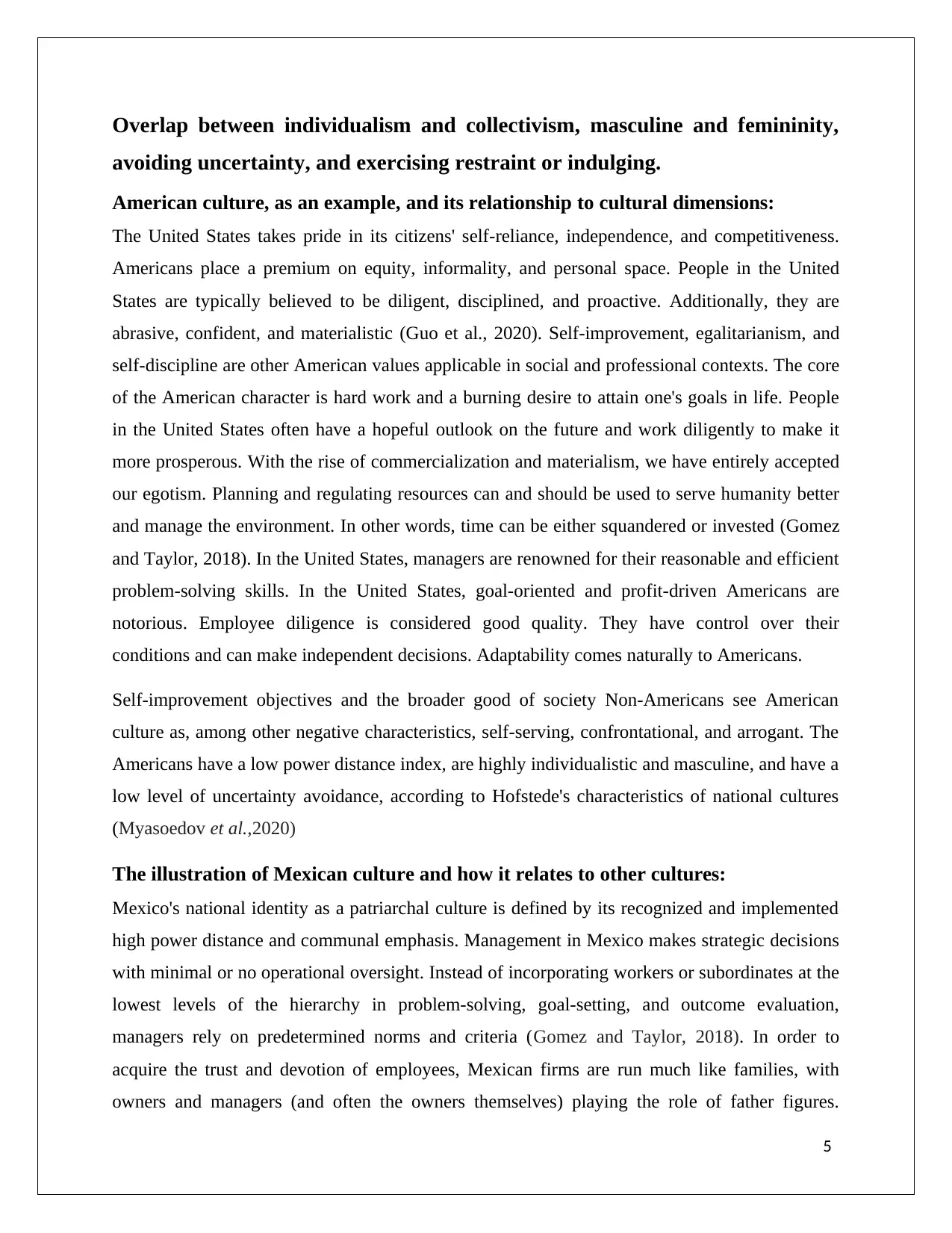
5
Overlap between individualism and collectivism, masculine and femininity,
avoiding uncertainty, and exercising restraint or indulging.
American culture, as an example, and its relationship to cultural dimensions:
The United States takes pride in its citizens' self-reliance, independence, and competitiveness.
Americans place a premium on equity, informality, and personal space. People in the United
States are typically believed to be diligent, disciplined, and proactive. Additionally, they are
abrasive, confident, and materialistic (Guo et al., 2020). Self-improvement, egalitarianism, and
self-discipline are other American values applicable in social and professional contexts. The core
of the American character is hard work and a burning desire to attain one's goals in life. People
in the United States often have a hopeful outlook on the future and work diligently to make it
more prosperous. With the rise of commercialization and materialism, we have entirely accepted
our egotism. Planning and regulating resources can and should be used to serve humanity better
and manage the environment. In other words, time can be either squandered or invested (Gomez
and Taylor, 2018). In the United States, managers are renowned for their reasonable and efficient
problem-solving skills. In the United States, goal-oriented and profit-driven Americans are
notorious. Employee diligence is considered good quality. They have control over their
conditions and can make independent decisions. Adaptability comes naturally to Americans.
Self-improvement objectives and the broader good of society Non-Americans see American
culture as, among other negative characteristics, self-serving, confrontational, and arrogant. The
Americans have a low power distance index, are highly individualistic and masculine, and have a
low level of uncertainty avoidance, according to Hofstede's characteristics of national cultures
(Myasoedov et al.,2020)
The illustration of Mexican culture and how it relates to other cultures:
Mexico's national identity as a patriarchal culture is defined by its recognized and implemented
high power distance and communal emphasis. Management in Mexico makes strategic decisions
with minimal or no operational oversight. Instead of incorporating workers or subordinates at the
lowest levels of the hierarchy in problem-solving, goal-setting, and outcome evaluation,
managers rely on predetermined norms and criteria (Gomez and Taylor, 2018). In order to
acquire the trust and devotion of employees, Mexican firms are run much like families, with
owners and managers (and often the owners themselves) playing the role of father figures.
Overlap between individualism and collectivism, masculine and femininity,
avoiding uncertainty, and exercising restraint or indulging.
American culture, as an example, and its relationship to cultural dimensions:
The United States takes pride in its citizens' self-reliance, independence, and competitiveness.
Americans place a premium on equity, informality, and personal space. People in the United
States are typically believed to be diligent, disciplined, and proactive. Additionally, they are
abrasive, confident, and materialistic (Guo et al., 2020). Self-improvement, egalitarianism, and
self-discipline are other American values applicable in social and professional contexts. The core
of the American character is hard work and a burning desire to attain one's goals in life. People
in the United States often have a hopeful outlook on the future and work diligently to make it
more prosperous. With the rise of commercialization and materialism, we have entirely accepted
our egotism. Planning and regulating resources can and should be used to serve humanity better
and manage the environment. In other words, time can be either squandered or invested (Gomez
and Taylor, 2018). In the United States, managers are renowned for their reasonable and efficient
problem-solving skills. In the United States, goal-oriented and profit-driven Americans are
notorious. Employee diligence is considered good quality. They have control over their
conditions and can make independent decisions. Adaptability comes naturally to Americans.
Self-improvement objectives and the broader good of society Non-Americans see American
culture as, among other negative characteristics, self-serving, confrontational, and arrogant. The
Americans have a low power distance index, are highly individualistic and masculine, and have a
low level of uncertainty avoidance, according to Hofstede's characteristics of national cultures
(Myasoedov et al.,2020)
The illustration of Mexican culture and how it relates to other cultures:
Mexico's national identity as a patriarchal culture is defined by its recognized and implemented
high power distance and communal emphasis. Management in Mexico makes strategic decisions
with minimal or no operational oversight. Instead of incorporating workers or subordinates at the
lowest levels of the hierarchy in problem-solving, goal-setting, and outcome evaluation,
managers rely on predetermined norms and criteria (Gomez and Taylor, 2018). In order to
acquire the trust and devotion of employees, Mexican firms are run much like families, with
owners and managers (and often the owners themselves) playing the role of father figures.
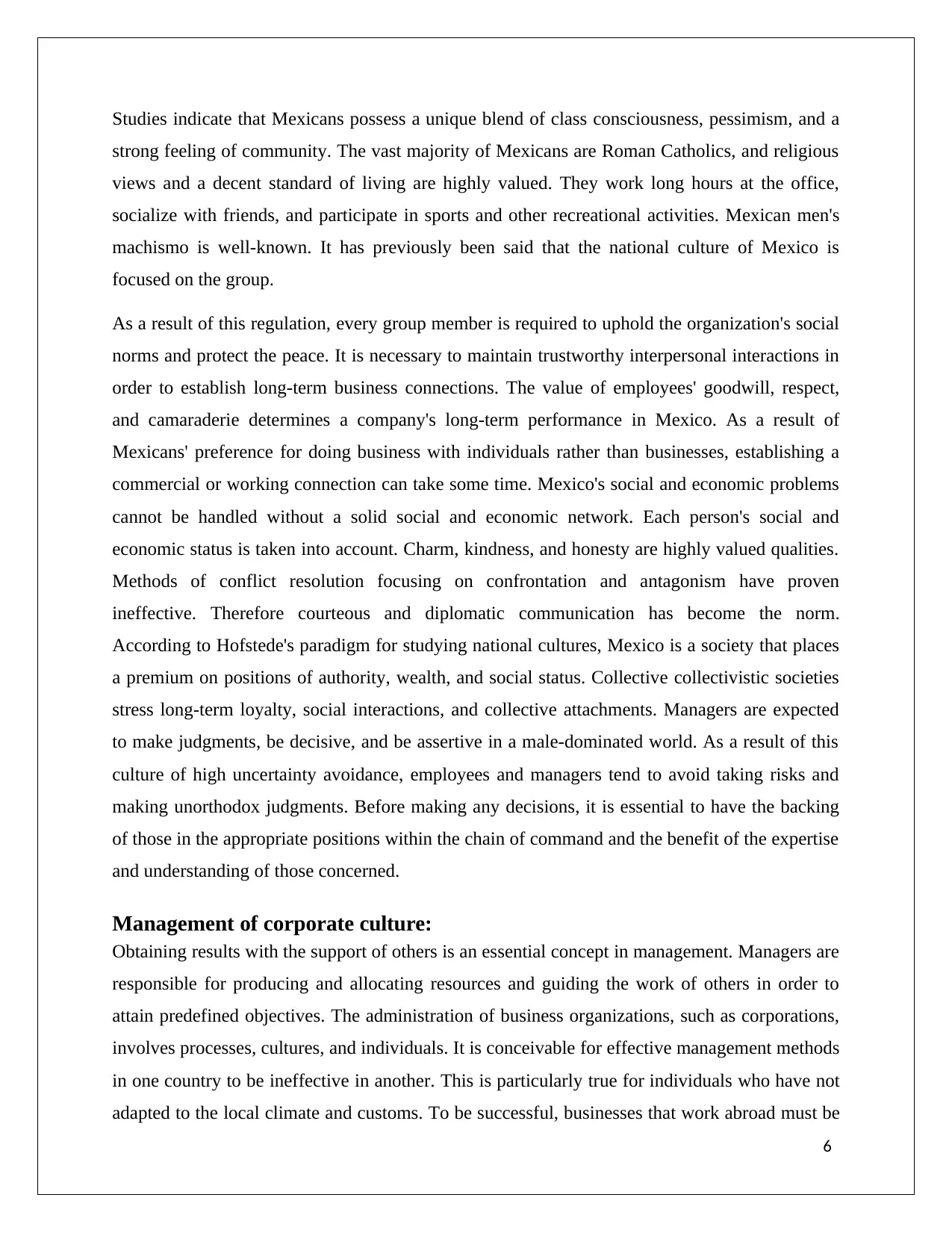
6
Studies indicate that Mexicans possess a unique blend of class consciousness, pessimism, and a
strong feeling of community. The vast majority of Mexicans are Roman Catholics, and religious
views and a decent standard of living are highly valued. They work long hours at the office,
socialize with friends, and participate in sports and other recreational activities. Mexican men's
machismo is well-known. It has previously been said that the national culture of Mexico is
focused on the group.
As a result of this regulation, every group member is required to uphold the organization's social
norms and protect the peace. It is necessary to maintain trustworthy interpersonal interactions in
order to establish long-term business connections. The value of employees' goodwill, respect,
and camaraderie determines a company's long-term performance in Mexico. As a result of
Mexicans' preference for doing business with individuals rather than businesses, establishing a
commercial or working connection can take some time. Mexico's social and economic problems
cannot be handled without a solid social and economic network. Each person's social and
economic status is taken into account. Charm, kindness, and honesty are highly valued qualities.
Methods of conflict resolution focusing on confrontation and antagonism have proven
ineffective. Therefore courteous and diplomatic communication has become the norm.
According to Hofstede's paradigm for studying national cultures, Mexico is a society that places
a premium on positions of authority, wealth, and social status. Collective collectivistic societies
stress long-term loyalty, social interactions, and collective attachments. Managers are expected
to make judgments, be decisive, and be assertive in a male-dominated world. As a result of this
culture of high uncertainty avoidance, employees and managers tend to avoid taking risks and
making unorthodox judgments. Before making any decisions, it is essential to have the backing
of those in the appropriate positions within the chain of command and the benefit of the expertise
and understanding of those concerned.
Management of corporate culture:
Obtaining results with the support of others is an essential concept in management. Managers are
responsible for producing and allocating resources and guiding the work of others in order to
attain predefined objectives. The administration of business organizations, such as corporations,
involves processes, cultures, and individuals. It is conceivable for effective management methods
in one country to be ineffective in another. This is particularly true for individuals who have not
adapted to the local climate and customs. To be successful, businesses that work abroad must be
Studies indicate that Mexicans possess a unique blend of class consciousness, pessimism, and a
strong feeling of community. The vast majority of Mexicans are Roman Catholics, and religious
views and a decent standard of living are highly valued. They work long hours at the office,
socialize with friends, and participate in sports and other recreational activities. Mexican men's
machismo is well-known. It has previously been said that the national culture of Mexico is
focused on the group.
As a result of this regulation, every group member is required to uphold the organization's social
norms and protect the peace. It is necessary to maintain trustworthy interpersonal interactions in
order to establish long-term business connections. The value of employees' goodwill, respect,
and camaraderie determines a company's long-term performance in Mexico. As a result of
Mexicans' preference for doing business with individuals rather than businesses, establishing a
commercial or working connection can take some time. Mexico's social and economic problems
cannot be handled without a solid social and economic network. Each person's social and
economic status is taken into account. Charm, kindness, and honesty are highly valued qualities.
Methods of conflict resolution focusing on confrontation and antagonism have proven
ineffective. Therefore courteous and diplomatic communication has become the norm.
According to Hofstede's paradigm for studying national cultures, Mexico is a society that places
a premium on positions of authority, wealth, and social status. Collective collectivistic societies
stress long-term loyalty, social interactions, and collective attachments. Managers are expected
to make judgments, be decisive, and be assertive in a male-dominated world. As a result of this
culture of high uncertainty avoidance, employees and managers tend to avoid taking risks and
making unorthodox judgments. Before making any decisions, it is essential to have the backing
of those in the appropriate positions within the chain of command and the benefit of the expertise
and understanding of those concerned.
Management of corporate culture:
Obtaining results with the support of others is an essential concept in management. Managers are
responsible for producing and allocating resources and guiding the work of others in order to
attain predefined objectives. The administration of business organizations, such as corporations,
involves processes, cultures, and individuals. It is conceivable for effective management methods
in one country to be ineffective in another. This is particularly true for individuals who have not
adapted to the local climate and customs. To be successful, businesses that work abroad must be
⊘ This is a preview!⊘
Do you want full access?
Subscribe today to unlock all pages.

Trusted by 1+ million students worldwide
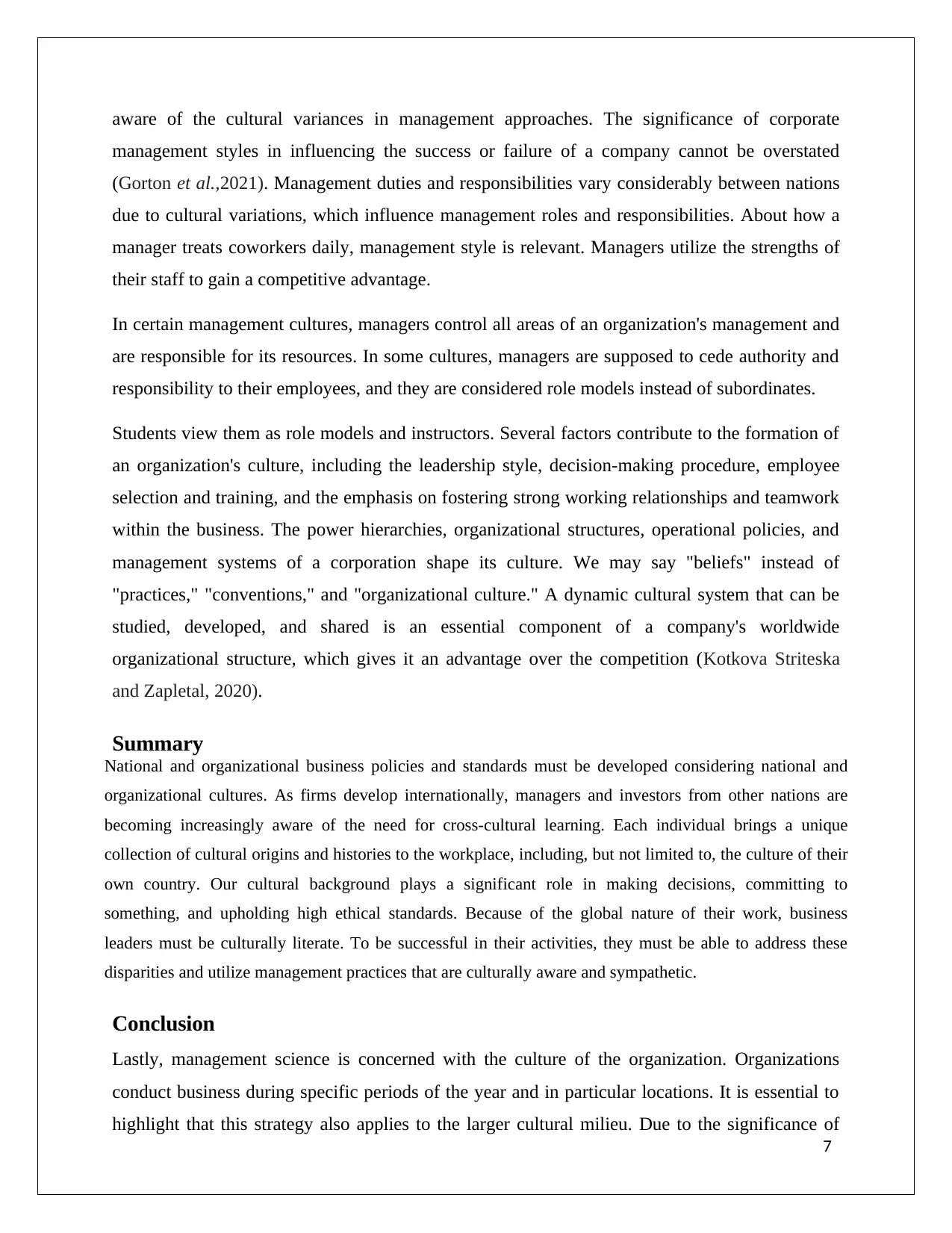
7
aware of the cultural variances in management approaches. The significance of corporate
management styles in influencing the success or failure of a company cannot be overstated
(Gorton et al.,2021). Management duties and responsibilities vary considerably between nations
due to cultural variations, which influence management roles and responsibilities. About how a
manager treats coworkers daily, management style is relevant. Managers utilize the strengths of
their staff to gain a competitive advantage.
In certain management cultures, managers control all areas of an organization's management and
are responsible for its resources. In some cultures, managers are supposed to cede authority and
responsibility to their employees, and they are considered role models instead of subordinates.
Students view them as role models and instructors. Several factors contribute to the formation of
an organization's culture, including the leadership style, decision-making procedure, employee
selection and training, and the emphasis on fostering strong working relationships and teamwork
within the business. The power hierarchies, organizational structures, operational policies, and
management systems of a corporation shape its culture. We may say "beliefs" instead of
"practices," "conventions," and "organizational culture." A dynamic cultural system that can be
studied, developed, and shared is an essential component of a company's worldwide
organizational structure, which gives it an advantage over the competition (Kotkova Striteska
and Zapletal, 2020).
Summary
National and organizational business policies and standards must be developed considering national and
organizational cultures. As firms develop internationally, managers and investors from other nations are
becoming increasingly aware of the need for cross-cultural learning. Each individual brings a unique
collection of cultural origins and histories to the workplace, including, but not limited to, the culture of their
own country. Our cultural background plays a significant role in making decisions, committing to
something, and upholding high ethical standards. Because of the global nature of their work, business
leaders must be culturally literate. To be successful in their activities, they must be able to address these
disparities and utilize management practices that are culturally aware and sympathetic.
Conclusion
Lastly, management science is concerned with the culture of the organization. Organizations
conduct business during specific periods of the year and in particular locations. It is essential to
highlight that this strategy also applies to the larger cultural milieu. Due to the significance of
aware of the cultural variances in management approaches. The significance of corporate
management styles in influencing the success or failure of a company cannot be overstated
(Gorton et al.,2021). Management duties and responsibilities vary considerably between nations
due to cultural variations, which influence management roles and responsibilities. About how a
manager treats coworkers daily, management style is relevant. Managers utilize the strengths of
their staff to gain a competitive advantage.
In certain management cultures, managers control all areas of an organization's management and
are responsible for its resources. In some cultures, managers are supposed to cede authority and
responsibility to their employees, and they are considered role models instead of subordinates.
Students view them as role models and instructors. Several factors contribute to the formation of
an organization's culture, including the leadership style, decision-making procedure, employee
selection and training, and the emphasis on fostering strong working relationships and teamwork
within the business. The power hierarchies, organizational structures, operational policies, and
management systems of a corporation shape its culture. We may say "beliefs" instead of
"practices," "conventions," and "organizational culture." A dynamic cultural system that can be
studied, developed, and shared is an essential component of a company's worldwide
organizational structure, which gives it an advantage over the competition (Kotkova Striteska
and Zapletal, 2020).
Summary
National and organizational business policies and standards must be developed considering national and
organizational cultures. As firms develop internationally, managers and investors from other nations are
becoming increasingly aware of the need for cross-cultural learning. Each individual brings a unique
collection of cultural origins and histories to the workplace, including, but not limited to, the culture of their
own country. Our cultural background plays a significant role in making decisions, committing to
something, and upholding high ethical standards. Because of the global nature of their work, business
leaders must be culturally literate. To be successful in their activities, they must be able to address these
disparities and utilize management practices that are culturally aware and sympathetic.
Conclusion
Lastly, management science is concerned with the culture of the organization. Organizations
conduct business during specific periods of the year and in particular locations. It is essential to
highlight that this strategy also applies to the larger cultural milieu. Due to the significance of
Paraphrase This Document
Need a fresh take? Get an instant paraphrase of this document with our AI Paraphraser
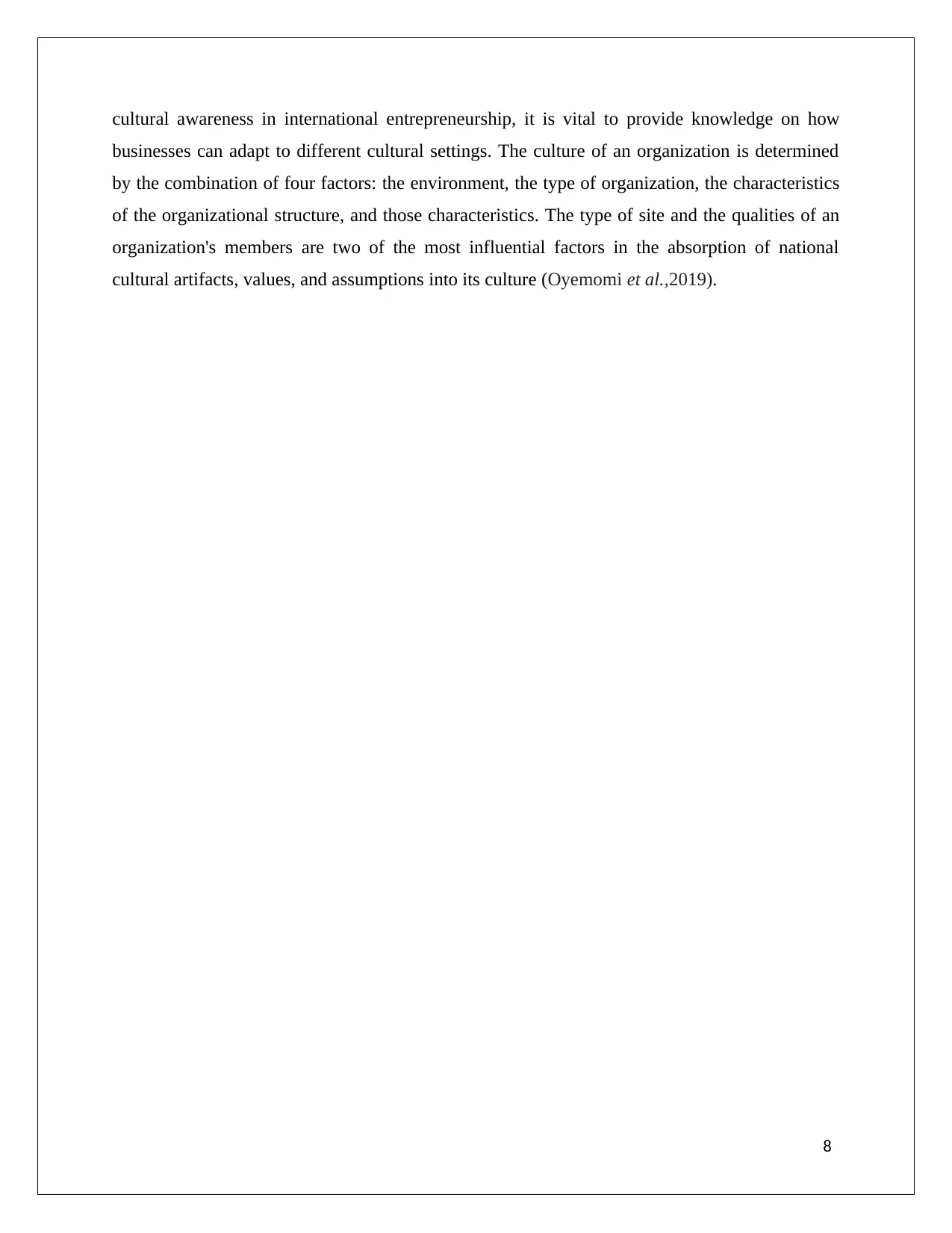
8
cultural awareness in international entrepreneurship, it is vital to provide knowledge on how
businesses can adapt to different cultural settings. The culture of an organization is determined
by the combination of four factors: the environment, the type of organization, the characteristics
of the organizational structure, and those characteristics. The type of site and the qualities of an
organization's members are two of the most influential factors in the absorption of national
cultural artifacts, values, and assumptions into its culture (Oyemomi et al.,2019).
cultural awareness in international entrepreneurship, it is vital to provide knowledge on how
businesses can adapt to different cultural settings. The culture of an organization is determined
by the combination of four factors: the environment, the type of organization, the characteristics
of the organizational structure, and those characteristics. The type of site and the qualities of an
organization's members are two of the most influential factors in the absorption of national
cultural artifacts, values, and assumptions into its culture (Oyemomi et al.,2019).
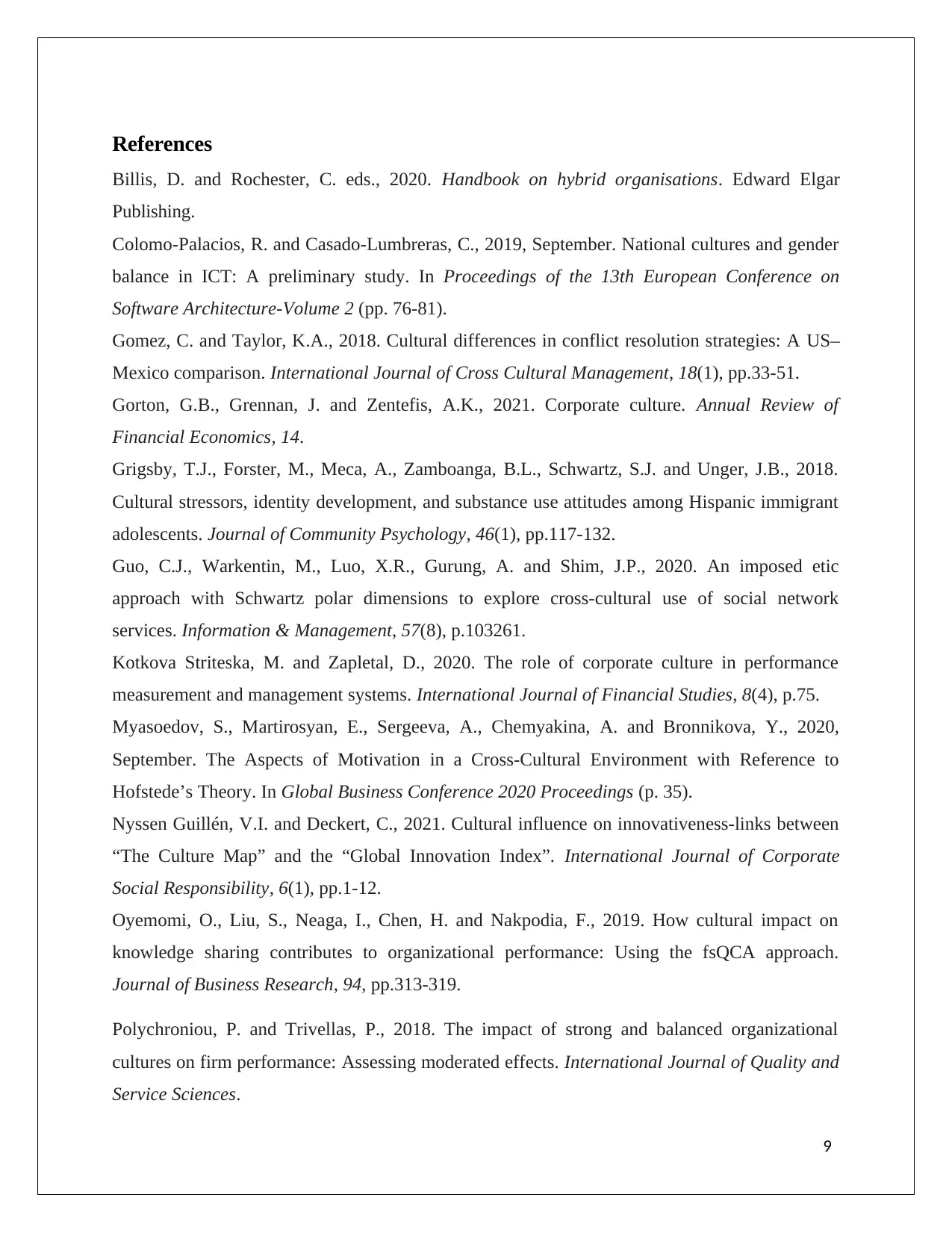
9
References
Billis, D. and Rochester, C. eds., 2020. Handbook on hybrid organisations. Edward Elgar
Publishing.
Colomo-Palacios, R. and Casado-Lumbreras, C., 2019, September. National cultures and gender
balance in ICT: A preliminary study. In Proceedings of the 13th European Conference on
Software Architecture-Volume 2 (pp. 76-81).
Gomez, C. and Taylor, K.A., 2018. Cultural differences in conflict resolution strategies: A US–
Mexico comparison. International Journal of Cross Cultural Management, 18(1), pp.33-51.
Gorton, G.B., Grennan, J. and Zentefis, A.K., 2021. Corporate culture. Annual Review of
Financial Economics, 14.
Grigsby, T.J., Forster, M., Meca, A., Zamboanga, B.L., Schwartz, S.J. and Unger, J.B., 2018.
Cultural stressors, identity development, and substance use attitudes among Hispanic immigrant
adolescents. Journal of Community Psychology, 46(1), pp.117-132.
Guo, C.J., Warkentin, M., Luo, X.R., Gurung, A. and Shim, J.P., 2020. An imposed etic
approach with Schwartz polar dimensions to explore cross-cultural use of social network
services. Information & Management, 57(8), p.103261.
Kotkova Striteska, M. and Zapletal, D., 2020. The role of corporate culture in performance
measurement and management systems. International Journal of Financial Studies, 8(4), p.75.
Myasoedov, S., Martirosyan, E., Sergeeva, A., Chemyakina, A. and Bronnikova, Y., 2020,
September. The Aspects of Motivation in a Cross-Cultural Environment with Reference to
Hofstede’s Theory. In Global Business Conference 2020 Proceedings (p. 35).
Nyssen Guillén, V.I. and Deckert, C., 2021. Cultural influence on innovativeness-links between
“The Culture Map” and the “Global Innovation Index”. International Journal of Corporate
Social Responsibility, 6(1), pp.1-12.
Oyemomi, O., Liu, S., Neaga, I., Chen, H. and Nakpodia, F., 2019. How cultural impact on
knowledge sharing contributes to organizational performance: Using the fsQCA approach.
Journal of Business Research, 94, pp.313-319.
Polychroniou, P. and Trivellas, P., 2018. The impact of strong and balanced organizational
cultures on firm performance: Assessing moderated effects. International Journal of Quality and
Service Sciences.
References
Billis, D. and Rochester, C. eds., 2020. Handbook on hybrid organisations. Edward Elgar
Publishing.
Colomo-Palacios, R. and Casado-Lumbreras, C., 2019, September. National cultures and gender
balance in ICT: A preliminary study. In Proceedings of the 13th European Conference on
Software Architecture-Volume 2 (pp. 76-81).
Gomez, C. and Taylor, K.A., 2018. Cultural differences in conflict resolution strategies: A US–
Mexico comparison. International Journal of Cross Cultural Management, 18(1), pp.33-51.
Gorton, G.B., Grennan, J. and Zentefis, A.K., 2021. Corporate culture. Annual Review of
Financial Economics, 14.
Grigsby, T.J., Forster, M., Meca, A., Zamboanga, B.L., Schwartz, S.J. and Unger, J.B., 2018.
Cultural stressors, identity development, and substance use attitudes among Hispanic immigrant
adolescents. Journal of Community Psychology, 46(1), pp.117-132.
Guo, C.J., Warkentin, M., Luo, X.R., Gurung, A. and Shim, J.P., 2020. An imposed etic
approach with Schwartz polar dimensions to explore cross-cultural use of social network
services. Information & Management, 57(8), p.103261.
Kotkova Striteska, M. and Zapletal, D., 2020. The role of corporate culture in performance
measurement and management systems. International Journal of Financial Studies, 8(4), p.75.
Myasoedov, S., Martirosyan, E., Sergeeva, A., Chemyakina, A. and Bronnikova, Y., 2020,
September. The Aspects of Motivation in a Cross-Cultural Environment with Reference to
Hofstede’s Theory. In Global Business Conference 2020 Proceedings (p. 35).
Nyssen Guillén, V.I. and Deckert, C., 2021. Cultural influence on innovativeness-links between
“The Culture Map” and the “Global Innovation Index”. International Journal of Corporate
Social Responsibility, 6(1), pp.1-12.
Oyemomi, O., Liu, S., Neaga, I., Chen, H. and Nakpodia, F., 2019. How cultural impact on
knowledge sharing contributes to organizational performance: Using the fsQCA approach.
Journal of Business Research, 94, pp.313-319.
Polychroniou, P. and Trivellas, P., 2018. The impact of strong and balanced organizational
cultures on firm performance: Assessing moderated effects. International Journal of Quality and
Service Sciences.
⊘ This is a preview!⊘
Do you want full access?
Subscribe today to unlock all pages.

Trusted by 1+ million students worldwide
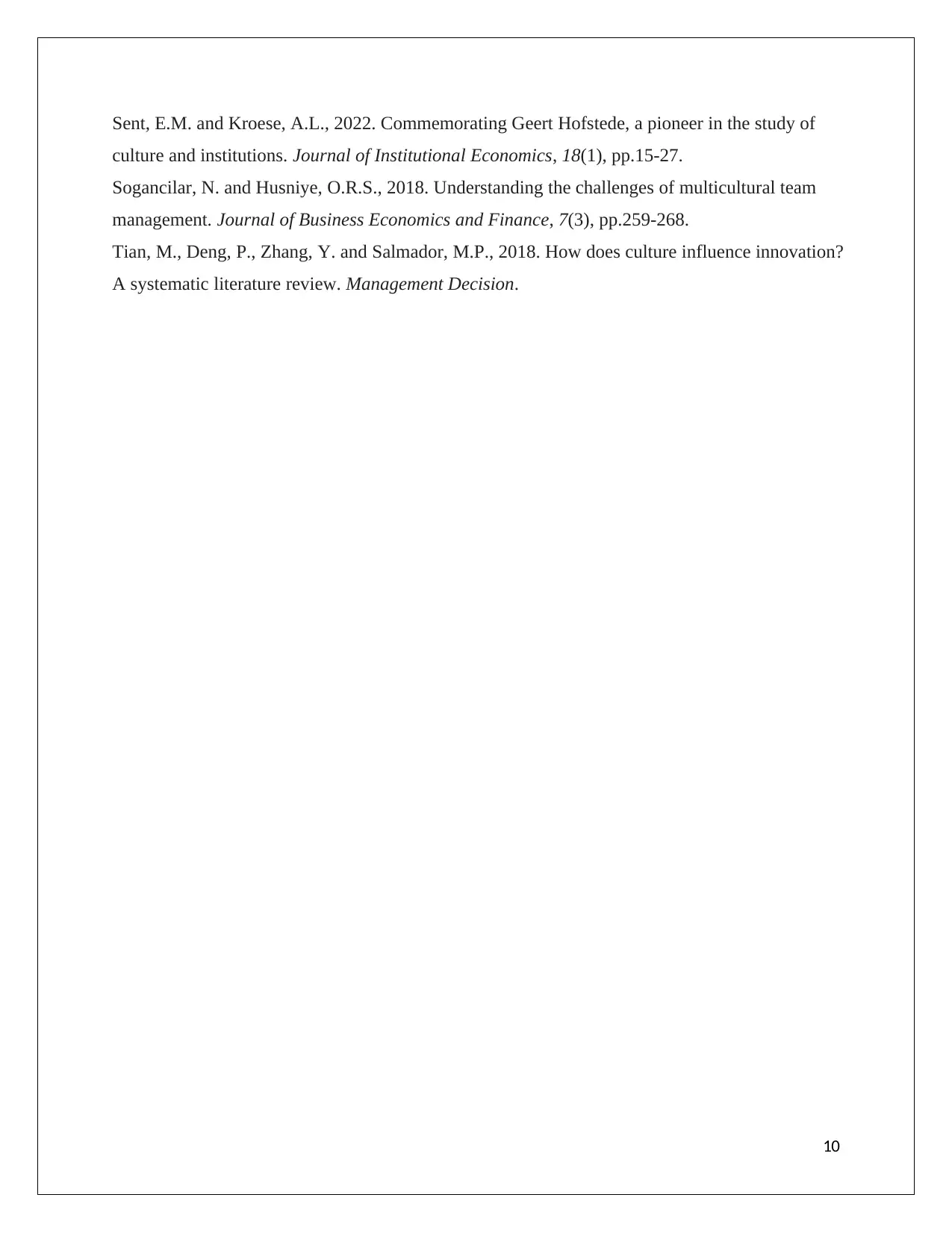
10
Sent, E.M. and Kroese, A.L., 2022. Commemorating Geert Hofstede, a pioneer in the study of
culture and institutions. Journal of Institutional Economics, 18(1), pp.15-27.
Sogancilar, N. and Husniye, O.R.S., 2018. Understanding the challenges of multicultural team
management. Journal of Business Economics and Finance, 7(3), pp.259-268.
Tian, M., Deng, P., Zhang, Y. and Salmador, M.P., 2018. How does culture influence innovation?
A systematic literature review. Management Decision.
Sent, E.M. and Kroese, A.L., 2022. Commemorating Geert Hofstede, a pioneer in the study of
culture and institutions. Journal of Institutional Economics, 18(1), pp.15-27.
Sogancilar, N. and Husniye, O.R.S., 2018. Understanding the challenges of multicultural team
management. Journal of Business Economics and Finance, 7(3), pp.259-268.
Tian, M., Deng, P., Zhang, Y. and Salmador, M.P., 2018. How does culture influence innovation?
A systematic literature review. Management Decision.
1 out of 10
Related Documents
Your All-in-One AI-Powered Toolkit for Academic Success.
+13062052269
info@desklib.com
Available 24*7 on WhatsApp / Email
![[object Object]](/_next/static/media/star-bottom.7253800d.svg)
Unlock your academic potential
Copyright © 2020–2026 A2Z Services. All Rights Reserved. Developed and managed by ZUCOL.





